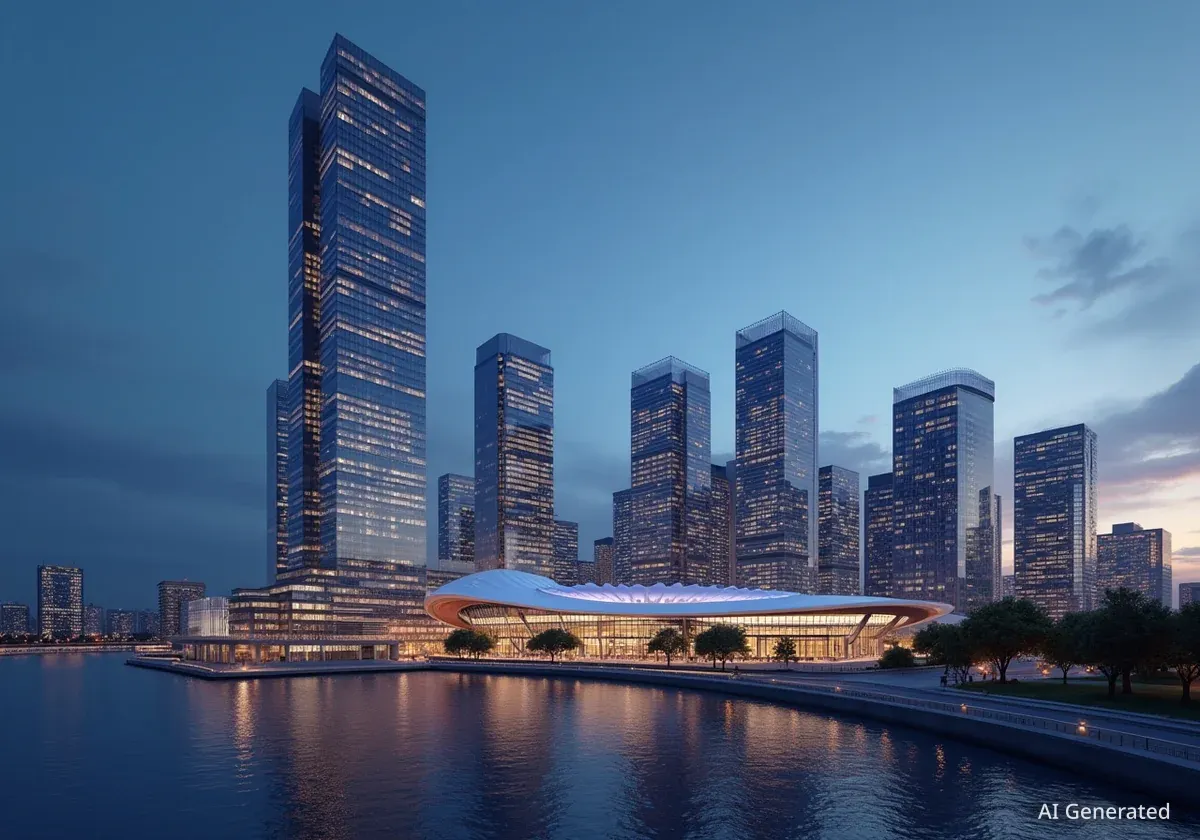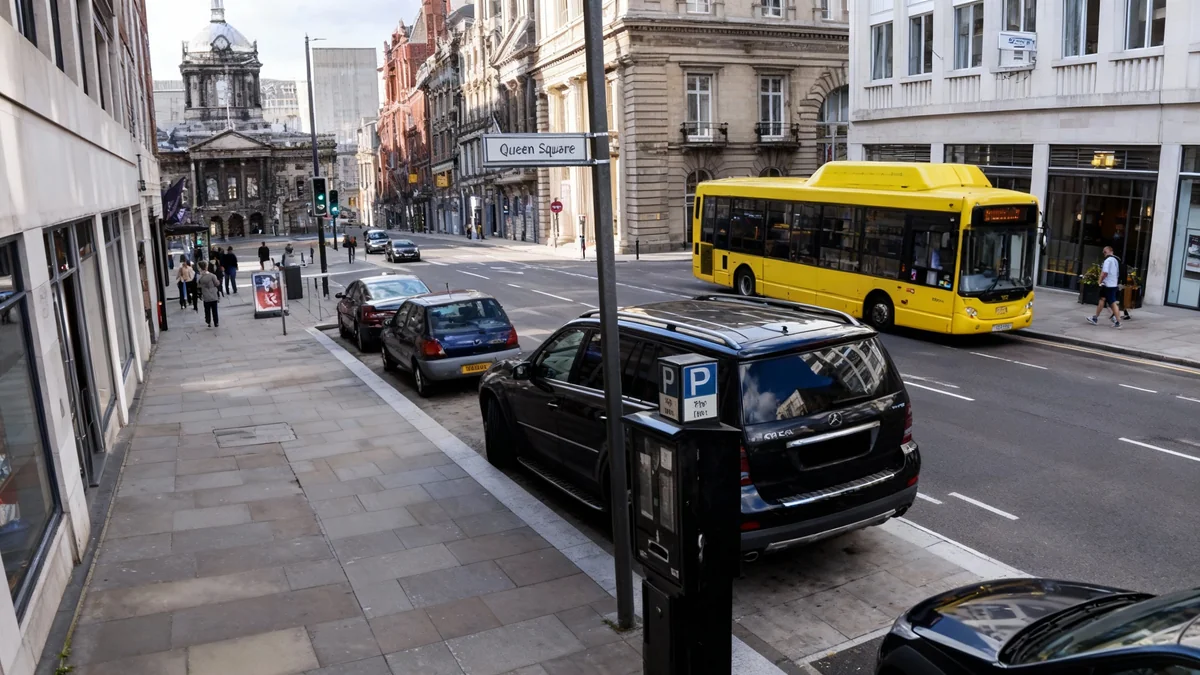An ambitious masterplan for Liverpool's waterfront includes proposals for a major new arena, thousands of homes, and the city's tallest skyscraper. The eight-acre development at the King Edward Triangle Industrial Estate, led by Davos Property Developments and the Beetham Group, aims to significantly reshape a key area of the city's docklands.
A report submitted to Liverpool City Council's cabinet outlines the scale of the project, which features a 250,000 square foot events venue. The plans, set for formal submission later this year, represent one of the most significant regeneration proposals for the city in recent years, promising a mix of residential, commercial, and leisure facilities.
Key Takeaways
- A new masterplan has been revealed for the eight-acre King Edward Triangle site on Liverpool's waterfront.
- The proposal includes a 250,000 sq ft 'destination arena' and 2,750 new homes.
- Plans also feature a 60-storey skyscraper, which would become the city's tallest building.
- The development includes office space, a hotel, retail units, and extensive public realm improvements.
- Liverpool City Council is considering a land sale to the developers to facilitate the project.
Project Details Emerge in Council Report
New details about the waterfront regeneration project have been made public through a report scheduled for discussion by Liverpool City Council's cabinet. The document provides the most comprehensive look yet at the vision held by developers Davos Property Developments and the Beetham Group for the King Edward Triangle site.
The centerpiece of the proposal is a large-scale entertainment and events venue. Described as a "destination arena," this facility would cover 250,000 square feet, positioning it as a major new attraction for the city. This element is designed to complement the extensive residential and commercial offerings planned for the surrounding area.
The plans also confirm the intention to construct several tall buildings, including a landmark skyscraper. At approximately 60 storeys, this tower would become the tallest building in Liverpool, significantly altering the city's skyline.
A Surge in Residential Development
A key aspect of the masterplan is its focus on housing. The report specifies a target of 2,750 new homes for the site. This figure is more than double the 1,200 units originally allocated for the area within the broader Liverpool Waters masterplan, indicating a substantial increase in the project's residential density.
This increase reflects a strong focus on creating a new residential community on the waterfront, supported by a range of amenities and services integrated into the development.
Project by the Numbers
- Total Area: 8 acres
- New Homes: 2,750
- Arena Space: 250,000 sq ft
- Hotel Rooms: 400
- Office Space: 200,000 sq ft (Grade A)
- Commercial/Leisure Space: 250,000 sq ft
- Public Realm: 400,000 sq ft
- Covered Parking: 1.8 million sq ft
A Mixed-Use Vision for the Waterfront
Beyond the headline arena and residential towers, the King Edward Triangle project is designed as a comprehensive mixed-use scheme. The developers aim to create a vibrant, self-contained district that integrates living, working, and leisure activities.
The commercial components are significant. The plan includes 200,000 square feet of Grade A office space, addressing the city's need for high-quality business accommodation. A further 250,000 square feet is designated for a mix of commercial leisure, retail, and food and beverage outlets. A high-end hotel with 400 rooms is also part of the proposal, catering to both tourists and business visitors drawn by the new arena and commercial hub.
Connecting City to Waterfront
A major challenge for development along Liverpool's waterfront has been the physical barrier created by The Strand, a major dual carriageway. The King Edward Triangle plan includes an ambitious proposal to build over a section of this road. This would create a seamless pedestrian connection between the city centre and the new development, improving accessibility and integrating the site more effectively with the rest of Liverpool.
Council Support and Land Acquisition
The project's progression depends on continued cooperation with Liverpool City Council. The cabinet is set to review a proposal for a land deal that is considered crucial for the development to move forward. The council is being asked to approve the sale of a plot off Great Howard Street to the developers.
According to the report, this land transaction is necessary to unlock the entire project. Failure to complete the sale could have a "significant detrimental impact" on the delivery of the wider masterplan, highlighting the importance of the council's decision.
Hugh Frost, founder of the Beetham Group, commented on the process and the developers' relationship with the city.
"We’re pleased with the council’s continued support and guidance for the project. This transaction, if approved, is another piece of the jigsaw. We aim to deliver a world class project and it is important that we continue to move at pace."
Frost's statement underscores the developers' commitment to advancing the project swiftly, with the land sale being a critical next step. The formal submission of the full planning application is expected to follow later in the year, after which it will undergo a detailed review process.
Impact on Liverpool's Future Development
The King Edward Triangle masterplan represents one of the largest and most ambitious regeneration projects proposed for Liverpool. Its scale and mix of uses have the potential to create a new economic and cultural hub for the city, extending the city centre's footprint to the waterfront.
The inclusion of a major arena could enhance Liverpool's standing as a destination for international events, concerts, and conferences. The significant increase in housing supply would also contribute to meeting the city's residential needs, while the new office and commercial spaces could attract new businesses and create thousands of jobs.
As the plans move towards formal submission, the project will be closely watched by residents, businesses, and urban planners. The decisions made by Liverpool City Council in the coming weeks will be pivotal in determining the future of this transformative waterfront scheme.





